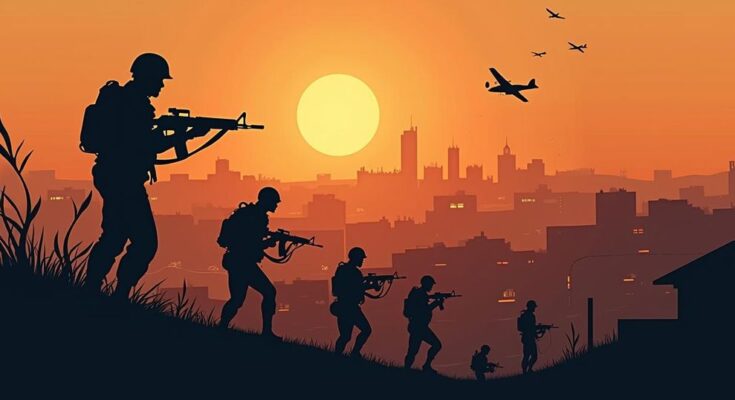Israel has struck Hezbollah positions in Damascus and Beirut as the IDF assesses the return of northern residents displaced by recent conflicts. Iran has warned Gulf states against aiding Israel, indicating potential repercussions. Meanwhile, Hezbollah has intensified its rocket attacks, including significant barrages into Haifa, prompting further military response from Israel. Key Hezbollah leaders have been killed in Israeli strikes, aiming to weaken their capabilities amid rising tensions in the region.
Israel has conducted strikes in Damascus, targeting Hezbollah positions, while the Israeli Defense Forces (IDF) are assessing the feasibility of allowing 60,000 northern residents to return to their homes. Concurrently, Tehran has issued a stern warning to Gulf states that any collaboration with Israel, particularly in the context of military operations against Iran, will elicit a response. Recent developments include an increase in rocket fire from Hezbollah into Israeli territories, particularly Haifa, alongside significant IDF operations aimed at dismantling Hezbollah’s military infrastructure in Lebanon. The IDF has reported the elimination of key Hezbollah officials, which is believed to weaken their operational capabilities. Amid these tensions, diplomatic movements are underway between Iran and Gulf states, emphasizing the importance of regional unity against perceived Israeli aggression. On Tuesday night, the IDF targeted Hezbollah infrastructure in Beirut as part of ongoing military efforts, while simultaneously assessing conditions for the safe return of displaced residents in northern Israel. IDF Chief Spokesman Daniel Hagari announced the casualties among Hezbollah’s leadership due to Israeli airstrikes, signaling a continued Israeli commitment to countering Hezbollah’s military threat. The situation remains tense as hostilities persist and regional diplomatic discussions unfold.
The seamless rise of tensions between Israel and Hezbollah has precipitated a significant military confrontation in the region, particularly following the Iranian missile strike on Israel. The IDF’s operations reflect a broader strategy to neutralize Hezbollah’s military capabilities, especially along the Israel-Lebanon border. Concurrently, Iranian officials have expressed their concerns regarding potential Gulf state alliances with Israel, which they regard as acts of aggression. The statement from Tehran underscores the complexity of regional dynamics where military actions are entwined with diplomatic relations. As both sides engage in military and verbal confrontations, the safety and return of northern Israeli residents displaced by the conflict remain pivotal in the IDF’s operational considerations.
In summary, Israel remains actively engaged in military operations against Hezbollah, aiming to mitigate threats from the north while addressing the pressing issue of displaced residents in the affected regions. Iran’s stern warnings to Gulf states highlight the potential for broader regional conflict should foreign alliances with Israel deepen. The coming weeks are likely to be critical as the IDF continues its strategic operations while simultaneously facilitating the return of civilians and responding to ongoing threats from both Hezbollah and other militant groups.
Original Source: www.jpost.com




